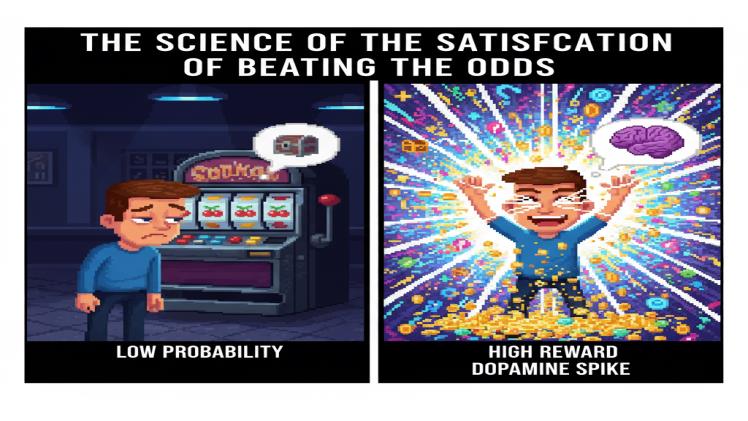There is a universal excitement to breaking the norm. It is in nailing a difficult prediction, finding a rare sports win, or just getting a surprising win on the Internet that human beings are conditioned to celebrate the victory over the odds. But what is the reason why this small victory gives our brains the light of a firework? And why does it seem not proportionately gratifying in comparison with ordinary achievements? Now, we will explore the exciting science of this phenomenon–we will not make it a neuroscience monologue, I promise.
1.The Bait of Beating the Odds.
It is not a mere slogan to beat the odds, but a universal fascination among humans. They are attracted to situations where the chances of winning appear low, whether it is lottery tickets or sports bets. According to psychologists, winning is not what the thrill is all about; it is about the tension, the anticipation and that brief period when the universe feels like it is on your side.
Even close calls, such as failing to solve a tricky puzzle or nearly missing a jackpot, may cause an adrenaline rush. That is referred to as the near-miss effect, in which the brain perceives progress as almost a win, prompting the dopamine system to overdrive. It is not just the reward that carries emotional heft, but the deliberations over risk and possible payoffs.
Consider it the instant gratification of your brain on steroids: the excitement is heightened precisely because it was difficult to come by or might have been easily lost.
2.Neuroscience: The Science of the Thrill.
When you go against the odds, it is not just a party your brain is throwing; it is firing the rewarding neurotransmitter dopamine when we do what we consider beneficial or exciting.
2.1 The Brains Reward System
The nucleus accumbent marks unexpected wins—a tiny yet powerful part of the brain that glows when we encounter them. These surprise wins contrast with predictable rewards, where the prediction error is the result (that is, a better one than expected). The result? Exaltation of pleasure and reinforcement make one more likely to repeat the same behaviour in the future.
This is why even online simulations, such as those on sites that show results, are so intoxicating. Unpredictability causes our brains to perceive variable rewards differently from predictable ones; when a small reward is received unexpectedly, it elicits a larger emotional spike.
2.2 Cognitive Biases at Play
A myriad of thought-distorting biases enhance the joy of overcoming the odds. Examples of the illusion of control include the belief that our decisions have a greater impact on an outcome than they actually do. Similarly, the gambler’s fallacy deceives the mind into perceiving where none are. Add in decision fatigue, and the cognitive resources needed to make rational judgments are depleted; you have a formula for experiencing the benefits of infrequent victories proportionately.
2.3 Brain Activity Table
Brain Region Reward Role Activation During Wins.
| Brain Area | Role in Reward | Activation During Wins |
| Nucleus Accumbens | Motivation & reward | Surges in dopamine when outcomes exceed expectations |
| Prefrontal Cortex | Decision-making | Engages in assessing risks and evaluating gains |
| Amygdala | Emotional response | Heightens excitement during near-misses or unexpected wins |
3.Online Interaction and Digital Trend.
Such nervous peculiarities are not reduced to playing cards or dice. Platforms in the contemporary digital world exploit our brain’s affinity for variable rewards. Examples of online casino ecosystems include National Casino Spain. In this case, planned experiences such as bonus packages, progressive jackpots, and timed challenges exploit the dopamine loop.
3.1 Gamification as Instant Gratification.
Digital platforms have become masters at shaping behavioural trends to achieve maximum engagement. Casino bonus codes, for example, are not only benefits but also instruments that generate a consistent rhythm of small victories. Every reward or bonus triggers the brain’s reward mechanism, making subsequent interactions less repetitive. It is its online version of one more spin or one rounder, which capitalizes on variable payoffs and intermittent reinforcement.
Describes the process of designing a cognitive hook.
Features of gamification, like progress bars, streak counters, and unlockable achievements, are not merely ornamental but designed to tap into human fascination with overcoming odds and meeting milestones. Such a reaction of immediate gratification and anticipation keeps users engaged, which is how behavioural economic insights can be used to influence the user experience.
These mechanics bring into focus a universal truth, whether you are a high roller or not: our brains react strongly to infrequent wins, pattern identification, and times of control, both in real life and online.
4.Expert Perspectives
Both behavioural economists and neuroscientists have discussed questions about the attraction of human beings to risk and reward. Dr Emily Walters, a cognitive neuroscientist, notes:
Unexpected rewards are disproportionately important in the eyes of the brain. Municipal achievements can be monumental in their own right since they temporarily suppress our internal sense of probability and control.
At the same time, specialists in digital engagement note that platforms such as National Casino Spain apply these insights discreetly. They create an environment that is both captivating and easy to enjoy and enter.
The science of beating the odds provides a peephole into human motivation, decision-making, and pleasure. It describes why we pursue elusive victories, why close calls hurt (or thrill), and why online space is structured to keep us in suspense. It is not simply a matter of luck — it is merely a question of our brains being wired so that we love the rush of going against the odds.
